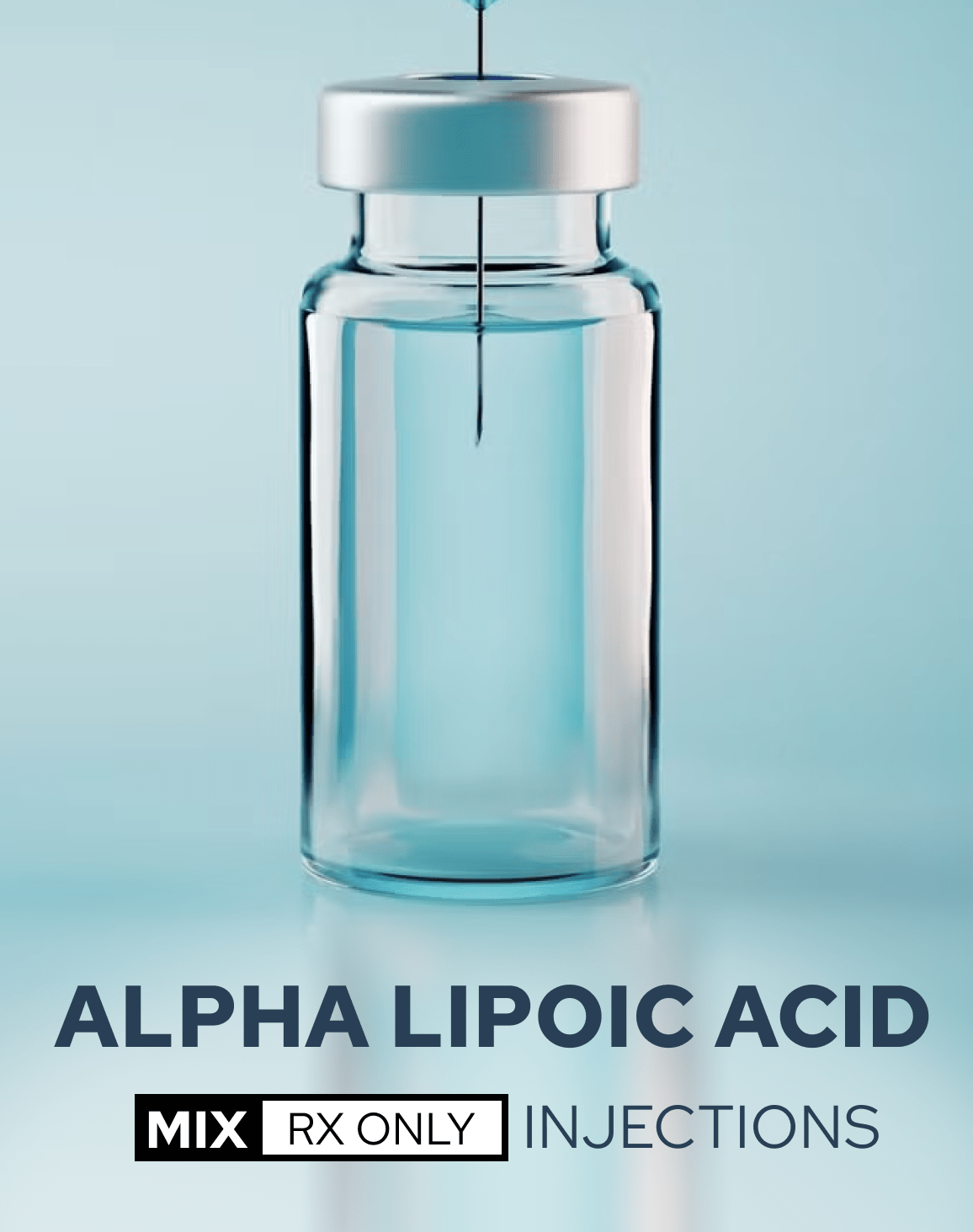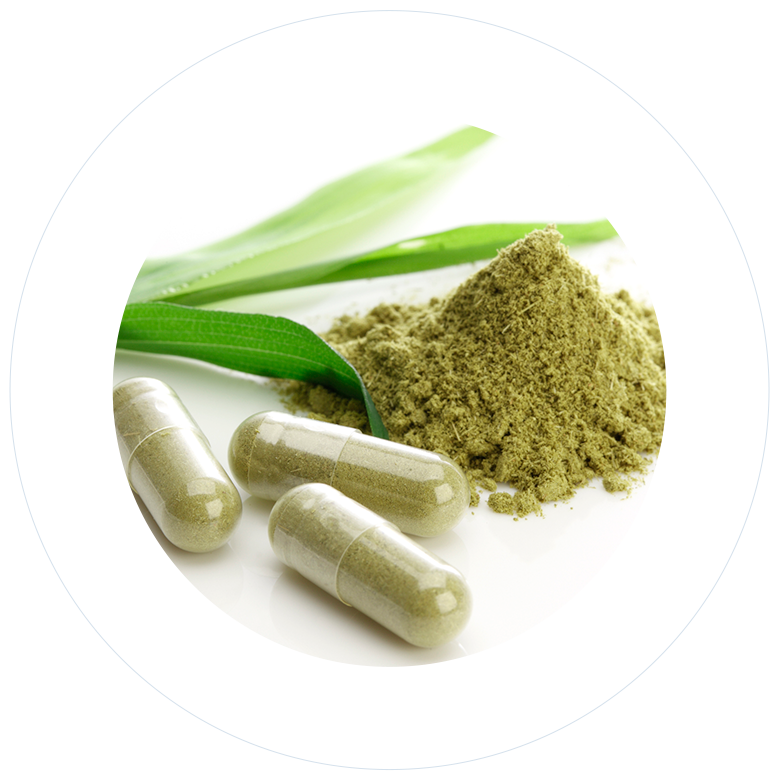Alpha Lipoic Acid Injections
Purchase Alpha Lipoic Acid Injections for enhanced health and vitality. Fast shipping and quality assurance. Order now!
SHARE THIS PRODUCT:
Benefits, Dosage, and Side Effects of Alpha Lipoic Acid Injections
Alpha Lipoic Acid (ALA) injections offer significant benefits for metabolic health and cellular protection, enhancing glucose metabolism and energy conversion. These injections aid in managing conditions like diabetes mellitus by improving insulin sensitivity and reducing neuropathic pain. Additionally, ALA has potent antioxidant properties that safeguard cells against oxidative stress. However, it is essential to follow correct dosage guidelines, as advised by healthcare professionals and private label supplement manufacturers, to maximize benefits and minimize risks.
Potential side effects should be monitored to ensure patient safety. Regular consultation with healthcare providers is vital for appropriate administration and dosage adjustments based on individual needs. Overall, ALA injections support various health aspects, including liver and immune health, thereby enhancing overall wellbeing.
Introduction to Alpha Lipoic Acid (ALA)
Alpha Lipoic Acid (ALA) is a naturally occurring compound essential for energy metabolism and cellular protection. Known for its potent antioxidant properties, ALA helps convert carbohydrates into energy and participates in various metabolic processes. The body produces ALA in small amounts, and it is also available from dietary sources such as spinach, broccoli, and organ meats.
When administered in higher concentrations through injections, ALA offers enhanced therapeutic benefits, including improved insulin sensitivity and neuropathic pain management. As a regenerative antioxidant, ALA boosts the effectiveness of other antioxidants like glutathione and vitamin C. This comprehensive introduction highlights ALA’s vital role in supporting metabolic health and protecting cells from oxidative stress.
What is Alpha Lipoic Acid?
Alpha Lipoic Acid is a sulfur-containing compound crucial for cellular energy production. It functions as a coenzyme in the mitochondrial pathways, aiding in the conversion of nutrients into energy. ALA is also recognized for its ability to recycle other antioxidants, such as glutathione and vitamin C, enhancing its protective effects against oxidative damage.
Found in small amounts in the body and certain foods like spinach and organ meats, ALA’s therapeutic potential is significantly amplified when administered through injections. This multifaceted compound plays an essential role in various metabolic processes, promoting overall health and energy production while protecting cells from oxidative stress.
Natural Sources of ALA
While the body synthesizes Alpha Lipoic Acid in small amounts, it is also found in various dietary sources. Foods rich in ALA include spinach, broccoli, tomatoes, peas, and organ meats like liver and kidney. Despite its presence in these foods, the concentration is often insufficient for therapeutic purposes. Therefore, Alpha Lipoic Acid injections are recommended for individuals seeking higher efficacy in addressing metabolic and oxidative stress-related conditions. These injections ensure a consistent, potent, and bioavailable form of ALA, maximizing its health benefits. Incorporating ALA-rich foods can support overall health, but for targeted therapeutic outcomes, injections are more effective.
The Therapeutic Uses of ALA Injections
Alpha Lipoic Acid injections are valued for their extensive therapeutic benefits. These injections are particularly beneficial for conditions associated with oxidative stress and metabolic disorders.
Benefits for Diabetes and Neuropathy
Alpha Lipoic Acid (ALA) injections provide substantial benefits for individuals managing diabetes and neuropathy. ALA enhances insulin sensitivity, leading to better regulation of blood sugar levels and reduction of complications associated with diabetes mellitus. For those suffering from diabetic neuropathy, ALA injections can alleviate painful symptoms, such as tingling, numbness, and burning sensations, by reducing oxidative stress and inflammation in nerve cells. The antioxidative properties of ALA play a crucial role in preventing nerve damage and promoting nerve repair, further mitigating neuropathic pain. Regular use of ALA injections can thus improve metabolic health and quality of life for diabetic patients.
Additionally, by supporting efficient glucose metabolism and reducing oxidative damage, ALA helps in preventing the progression of diabetic complications. Healthcare providers should consider incorporating ALA injections into treatment regimens to offer their patients an effective solution for managing diabetes and neuropathic pain, enhancing overall patient well-being.
Antioxidant Properties and Other Health Benefits
Alpha Lipoic Acid (ALA) is renowned for its potent antioxidant properties, which play a crucial role in protecting cells from free radical damage. These antioxidative effects help maintain overall health by supporting liver function, enhancing the immune system, and promoting efficient energy production through improved mitochondrial function. ALA is unique in its ability to regenerate other antioxidants like glutathione and vitamin C, amplifying its protective benefits.
Additionally, it aids in reducing oxidative stress, which is linked to various chronic diseases. Regular administration of ALA injections can lead to better cellular health, increased energy levels, and enhanced resistance to conditions associated with oxidative damage. Beyond its antioxidative capabilities, ALA supports glucose metabolism and improves insulin sensitivity, offering significant benefits for individuals with metabolic disorders like diabetes. By integrating ALA injections into treatment protocols, healthcare providers can address multiple aspects of patient health, ensuring comprehensive and effective care.
Alpha Lipoic Acid Injection Dosage Guidelines
Proper dosing of Alpha Lipoic Acid (ALA) injections is essential for maximizing therapeutic benefits and minimizing risks. The standard Alpha Lipoic Acid Injection dosage typically ranges from 300 to 600 mg per day, administered intravenously. However, dosage should be tailored to individual patient needs, considering factors such as age, overall health, and the specific condition being treated. Healthcare providers should perform a thorough assessment and continuously monitor the patient’s response to adjust the Alpha Lipoic Acid Injection dosage as necessary. ALA injections are available in concentrations ranging from 25 mg/ml to 50 mg/ml, and selecting the appropriate concentration is vital for achieving effective treatment outcomes. Proper administration techniques are crucial, ensuring sterility and accuracy in dosage measurement. By adhering to these guidelines, healthcare providers can optimize the benefits of ALA injections, improving metabolic health, enhancing insulin sensitivity, and protecting cells from oxidative stress, thereby ensuring overall patient well-being. Always consult a healthcare professional for personalized Alpha Lipoic Acid Injection dosage recommendations.
Recommended Dosage and Administration
Alpha Lipoic Acid (ALA) injections are typically administered intravenously, allowing for rapid absorption and effectiveness. The standard dosage ranges from 300 to 600 mg per day; however, this can vary based on individual health conditions, age, and specific treatment goals. Healthcare providers should assess each patient’s unique needs and adjust the dosage accordingly to achieve optimal therapeutic outcomes. Continuous monitoring of the patient’s response to the treatment is crucial, with revisions to the dosage as necessary.
Proper administration techniques are essential to ensure safety and maximize the efficacy of the treatment. It is also important to follow all guidelines and protocols for IV administration, maintaining sterility and accuracy in dosage measurement. By adhering to these practices, healthcare providers can effectively utilize ALA injections to support metabolic health, improve insulin sensitivity, and protect cells from oxidative stress, ultimately enhancing patient well-being. Always consult a healthcare professional for personalized dosage recommendations.
Dosage Strength and Concentration
Alpha Lipoic Acid (ALA) injections are available in various strengths and concentrations, typically ranging from 25 mg/ml to 50 mg/ml. Selecting the appropriate concentration is crucial and should align with the patient’s specific health needs and therapeutic goals. Healthcare providers must consider individual factors, such as the patient’s overall health, age, and severity of the condition being treated. By accurately determining the optimal concentration, they can ensure effective treatment while minimizing potential risks.
Adjustments in dosage strength and concentration may be necessary based on the patient’s response to initial treatments. Continuous monitoring and periodic reassessment are essential to maintain efficacy and safety. Proper selection of dosage strength ensures that patients receive the most effective and targeted care, maximizing the benefits of ALA injections. Through careful consideration and professional judgment, healthcare providers can achieve optimal therapeutic outcomes for their patients, enhancing their overall health and well-being.
Potential Side Effects and Precautions
While Alpha Lipoic Acid (ALA) injections offer numerous health benefits, they can also cause side effects. Common side effects include headaches, nausea, and dizziness, which are generally mild and temporary but should be monitored. Patients should inform their healthcare provider if these symptoms persist. ALA injections are contraindicated for individuals with known allergies to the components of ALA.
Additionally, potential drug interactions must be considered, particularly with chemotherapy drugs and thyroid hormone treatments. Therefore, it is crucial to perform a thorough medical review and consult with other healthcare professionals when necessary. Close monitoring and open communication between the healthcare provider and patient can effectively manage and mitigate risks. By understanding these precautions, providers can ensure the safe and effective use of ALA injections, enhancing patient well-being and treatment success. Always follow medical advice and guidelines to optimize therapeutic outcomes while minimizing adverse effects.
Common Side Effects
Common side effects of Alpha Lipoic Acid injections include headaches, nausea, and dizziness. These symptoms are generally mild and temporary but can be uncomfortable for patients. It is essential to inform patients about potential side effects and advise them to report any persistent or worsening symptoms. By doing so, healthcare providers can adjust treatment protocols as necessary to ensure patient safety and comfort. Understanding and managing these common side effects can enhance the overall patient experience and treatment efficacy.
Contraindications and Drug Interactions
Alpha Lipoic Acid injections should be avoided in patients with known allergies to any components of the injection. Additionally, ALA may interact with certain medications, including chemotherapy drugs and thyroid hormone treatments. Healthcare providers should perform a thorough medical history review to identify potential contraindications and drug interactions. Consulting with the patient’s primary care physician or specialists may also be necessary to ensure the safe and effective use of ALA injections. By identifying these factors beforehand, healthcare providers can mitigate risks and optimize treatment outcomes for their patients.
Storage and Handling of ALA Injections
Proper storage and handling of Alpha Lipoic Acid injections are crucial to maintain their efficacy and safety. The injections should be stored in a cool, dry place away from direct sunlight. Vials must be securely closed and stored according to the manufacturer’s guidelines. It is also essential to monitor expiration dates and avoid using expired products. Healthcare providers should ensure that all staff are trained in proper storage and handling procedures to prevent contamination or degradation of the injections. By adhering to these guidelines, the therapeutic potential of Alpha Lipoic Acid injections can be preserved, ensuring patient safety and treatment effectiveness.
How to Obtain Alpha Lipoic Acid Injections
Healthcare providers can purchase high-quality Alpha Lipoic Acid injections from Legere Pharmaceuticals. Our pharmaceutical-grade solutions are ideal for various clinical practices, including IV therapy clinics, nutritionists, and weight loss clinics. To obtain these injections, contact our sales team for more information on product availability and pricing. Legere Pharmaceuticals is committed to providing top-quality, effective solutions tailored to meet the unique needs of medical professionals. By partnering with us, healthcare providers can enhance their practice offerings, ensuring optimal patient care and treatment outcomes.
What is Alpha Lipoic Acid used for?
Alpha Lipoic Acid is used to support glucose metabolism, enhance energy production, and protect cells from oxidative stress. It is particularly effective in managing diabetes mellitus and diabetic neuropathy by improving insulin sensitivity and reducing neuropathic pain. Additional benefits include liver health support, immune system enhancement, and overall cellular protection. By incorporating Alpha Lipoic Acid into treatment protocols, healthcare providers can address various metabolic and oxidative stress-related conditions, improving patient health and wellbeing.
Can ALA Injections Help with Weight Loss?
Alpha Lipoic Acid injections may aid in weight loss by enhancing glucose metabolism and energy production. However, it is essential to consider these injections as part of a comprehensive weight management plan that includes diet, exercise, and other lifestyle modifications.
While ALA can support metabolic processes and improve energy utilization, achieving sustainable weight loss requires a multifaceted approach. Healthcare providers should tailor weight loss strategies to individual patient needs, incorporating ALA injections as a supportive measure rather than a standalone solution.
How are ALA Injections Administered?
Alpha Lipoic Acid injections are typically administered intravenously by a healthcare provider. The standard dosage ranges from 300 to 600 mg per day, adjusted based on individual patient needs and health conditions. Proper administration techniques are crucial to ensure rapid absorption and therapeutic effectiveness. Healthcare providers should continuously monitor patients during administration and adjust the dosage as necessary to achieve optimal outcomes. By following these guidelines, healthcare providers can maximize the benefits of ALA injections, ensuring safe and effective treatment for their patients.
What are the Side Effects of ALA Injections?
Common side effects of Alpha Lipoic Acid injections include headaches, nausea, and dizziness. These symptoms are generally mild and temporary but should be reported to a healthcare provider if they persist or worsen. Additionally, patients with known allergies to ALA components should avoid these injections. Potential drug interactions should also be considered, particularly with chemotherapy drugs and thyroid hormone treatments. By understanding and managing these side effects, healthcare providers can ensure patient safety and enhance treatment efficacy, providing a positive experience for those receiving ALA injections.
For high-quality Alpha Lipoic Acid injections and tailored healthcare solutions, contact Legere Pharmaceuticals today. Enhance your practice and improve patient outcomes with our pharmaceutical-grade products.
Moreover, you may explore Legere Pharmaceuticals’ IV supplements, Immune Booster Supplements, Private Label Skin Care Products, Private Label Weight Loss Supplements, lipo mino mix injections, and more through our website.
efelle creative
Legere: Your Partner in Success

Ready to Start Growing Your Practice? Let’s Chat!
Schedule a no obligation/no-pressure call to quickly increase your weight loss clinic’s revenue.




